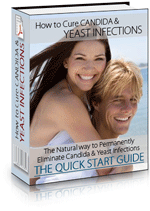Natural Treatment of Yeast Infection during Pregnancy

Natural Treatment of Yeast Infection during Pregnancy
Any treatment, whether natural or drug, during pregnancy requires careful consideration of the risk versus benefit to the mother and baby. Some drugs and natural treatments are capable of being absorbed and crossing the placenta to the baby. Thus, you should be concerned about negative effects on the baby. There are no published reports of the effects of natural remedies on the baby in the uterus.
Vaginal yeast infections during pregnancy can be helped by making changes in eating patterns, as well as in the environment that is allowing the yeast to thrive. In the last three months of pregnancy, after the entire baby's organ systems have developed, there is less risk to the baby from drug or natural treatments.
Using a treatment that is applied to the skin of the area, during the last three months of pregnancy, is low in risk to both the mother and the baby. Because of concerns for the baby's well being, you should consult with your health care professional before using any treatment, whether natural or drug, during pregnancy.
You must treat your sexual partner - especially in cases of chronic yeast infections. Yeast infections are easily passed back and forth between partners and in many cases, especially in men, the infections do not cause symptoms. Have your partner take concentrated cranberry capsules (vegetarian), one every 6 - 12 hours. Another suggestion is to have your partner take 1000 mg vitamin C daily to acidify urine.
Additional Healing Measures Wash genitals before and after sexual intercourse with 1 tbsp. distilled white vinegar diluted in 2 cups warm water. Since sexual intercourse can irritate the inflamed vaginal area, try to avoid it as much as possible during treatment. Sexual intercourse can also force the yeast organisms further up into the uterus and fallopian tubes. You should use condoms until the yeast infection is gone. Avoid anything that lowers your body's natural resistance to disease i.e., junk food, drugs, alcohol, stress, and fatigue Avoid tight fitting clothing, pantyhose without a cotton crotch panel, and non-cotton underwear. Cotton allows the vagina to "breathe."
After washing your underwear, boil it for five minutes to kill germs. Avoid wearing a damp bathing suit for any extended period of time. Make sure the outer vaginal area is completely dry after bathing. A warm, moist environment encourages yeast to grow. Avoid douches, with the exception of the natural douche treatments outlined in this book. Douches rinse away healthy vaginal secretions and friendly bacteria and can also cause the surface of the vaginal area to become too dry.
Avoid perfumed feminine hygiene sprays. Avoid any bubble baths and especially avoid non-organic soaps. Beware of fake natural soaps - most of these contain harsher chemicals than the average soap. Check the ingredients - if they are non-organic and/or filled with perfumes and artificial colors - don't use that soap while you have the yeast infection. Soap is really a harsh alkaline (especially brand name, chemical ones) and it upsets the normal PH of your vagina. Most bubble bath is a detergent, and it lessens the protection that vaginal bacteria offer against infection.
Click this link to great information
http://tinyurl.com/5b9v3q

Comments